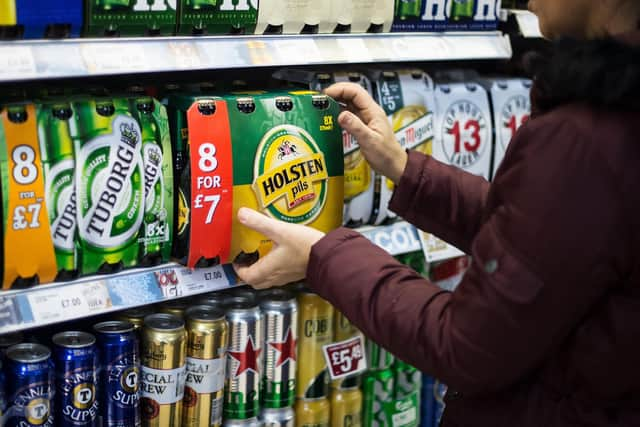Alcohol price rise: How much will alcohol, including beer, wine and whisky, cost in Scotland under new minimum unit pricing (MUP) rate? How does it compare to England?
A statement in Holyrood on Thursday is expected to confirm the base rate of MUP will increase from 50p to 65p from early May.
This would mean the lowest price for a bottle of wine would rise from £4.88 to £6.34.
Advertisement
Hide AdAdvertisement
Hide AdMinimum unit pricing is calculated using a simple formula – the price per unit (currently £0.50) x the strength of alcohol (ABV) x the volume in litres.


If we apply the potential new price of 65p to this formula, this is what we get:
- Scotch whisky 40% 700ml bottle: £18.20, currently £14
- Vodka/ gin 37.5% 700ml bottle: £17.07, currently £13.13
- Vodka/ gin 37.5% 1000ml bottle: £24.38, currently £18.75
- Wine 12% 750ml bottle: £5.85, currently £4.50
- Wine 13% 750ml bottle: £6.34, currently £4.88
- Beer 5% 4x440ml cans: £5.72, currently £4.40
- Beer 4% 330ml bottle: £0.86, currently £0.66
- Lager 4% 4x440ml cans: £4.58, currently £3.52
- Lager 4.6% 660ml bottle: £1.98, currently £1.52
- Cider 4.5% 4x440ml cans: £5.15, currently £3.96
- Cider 7.5% 1000ml bottle: £4.88, currently £3.75
Minimum unit pricing is separate to alcohol duty rates, which are a reserved matter and are set by the UK government. MUP only applies in Scotland, meaning the cheapest products in Scotland are much more expensive than those in England.
Due to the cost of higher-quality drinks such as wine and whisky, MUP tends to have little effect on price. However, cheap cider and beer now cost much more in Scotland than in the rest of the UK. As a result, products such as three-litre bottles of high strength cider have largely disappeared in Scottish supermarkets, and been replaced with smaller containers, but oversized bottles can still be found in English shops.


Alcohol duty rates are different for beer, cider, sparkling cider, spirits, wine, and draught products. The rates are calculated by the percentage of alcohol per litre of each product, and are paid by the manufacturer of the products. The cost of alcohol duty is often passed onto customers, leaving announcements on alcohol duty rates as one of the most anticipated items in the UK government’s budgets. Freezing alcohol duty rates, or even lowering them, has frequently been seen as a vote winner by governments heading into a general election.
The Scottish Government had previously consulted on increasing the MUP to 65p. At the time, Elena Whitham, the minister for drugs and alcohol policy, said: “The recent rise in alcohol-specific deaths highlights the need for more to be done to tackle alcohol-related harm.
“Our world-leading minimum unit pricing policy is one of the measures we know can make a difference. Recent research estimated it has saved hundreds of lives, likely averted hundreds of alcohol-attributable hospital admissions each year – and also contributed to reducing health inequalities. It is one of a range of measures we have in place across prevention and treatment services to reduce alcohol harm.”
Last year, Public Health Scotland said MUP had reduced deaths directly caused by alcohol consumption by an estimated 13.4 per cent.
Advertisement
Hide AdAdvertisement
Hide AdClare Beeston, who led the evaluation of the policy, said: “We have seen reductions in deaths and hospital admissions directly caused by sustained, high levels of alcohol consumption, and this is further evidence that those drinking at harmful and hazardous levels have reduced their consumption.”
She said the evidence showed MUP “has had a positive impact on improving health outcomes, including alcohol-related health inequalities, and can play a part in addressing the preventable harm that affect far too many people, families and communities”.
Comments
Want to join the conversation? Please or to comment on this article.